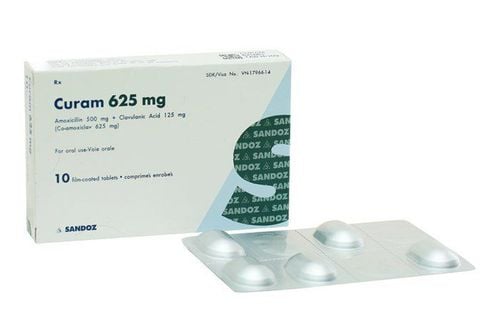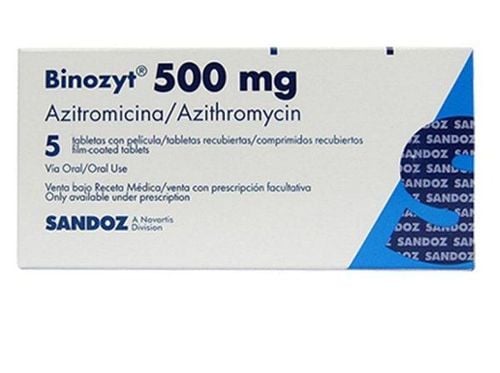1. Uses of Roxithromycin 150mg
What is Roxithromycin 150mg? The drug contains Roxithromycin 150mg as the main ingredient and excipients (Lactose, Sodium starch glycolate, Povidone, corn starch, Magnesium stearate, Colloidal silicon dioxide).
Roxithromycin is a semi-synthetic antibiotic belonging to the Macrolide group, with a broad spectrum of activity against gram-positive bacteria and some gram-negative bacteria. Regarding its mechanism of action, Roxithromycin reversibly binds to the 50S subunit of the ribosome in sensitive bacteria, inhibiting bacterial protein synthesis, thus effectively eliminating bacteria. Indications for Roxithromycin use: Treatment of infections caused by sensitive bacteria:
- Lower respiratory tract and ear-nose-throat infections such as: Bronchitis, pharyngitis, pneumonia, sinusitis, otitis media, esophagitis, tonsillitis;
- Skin and soft tissue infections: Furuncles, carbuncles, folliculitis, pyoderma, impetigo, infectious dermatitis, infected ulcers, cellulitis;
- Oral-dental infections;
- Non-gonococcal urogenital infections: Cervicitis-vaginitis, prostatitis, cervicovaginitis, salpingitis particularly due to Chlamydia infection, urethritis.
Contraindications for Roxithromycin use:
- People with hypersensitivity to the drug's ingredients or excipients;
- Concurrent use of Roxithromycin with ergotamine-type vasoconstrictor compounds;
- Patients taking Terfenadine or Astemizole (due to risk of severe cardiac arrhythmia);
- Children under 6 months of age.
2. How to use and dosage of Roxithromycin 150mg
Route of administration: Oral route. Roxithromycin 150mg tablets are suitable for adults and children 4 years and older. Should be taken before meals and not used for more than 10 days (unless prescribed by doctor).
Dosage:
- Adults: 1 tablet/time x 2 times/day;
- Children: 5 - 8mg/kg/day, divided into 2 doses;
- Patients with severe liver impairment: Should reduce dose to 1⁄2 of normal dose;
- Patients with severe kidney impairment: No dosage adjustment needed.
- Overdose: In case of Roxithromycin 150mg overdose, patients should go to the nearest hospital for appropriate treatment such as gastric lavage, supportive care, and symptomatic treatment.
- Missed dose: If a dose of Roxithromycin 150mg is missed, patients should take it as soon as possible. If it's close to the next dose, patients should skip the missed dose and take the next dose as scheduled. Patients should not take double the prescribed dose to make up for the missed dose.
3. Side effects of Roxithromycin 150mg
Some side effects patients may experience when using Roxithromycin 150mg include:
- Common: Nausea, vomiting, epigastric pain, diarrhea;
- Less common: Rash, urticaria, angioedema, bronchospasm, purpura, anaphylactic shock, dizziness, vertigo, headache, taste loss, smell loss, paresthesia, increase in drug-resistant bacteria, superinfection;
- Rare: Cholestatic hepatitis, elevated serum liver enzymes, symptoms of pancreatitis (very rare).
Patients should report side effects when using Roxithromycin 150mg to their doctor for appropriate advice and intervention.
4. Precautions when using Roxithromycin 150mg
Some notes patients should remember before and during Roxithromycin use:
- Use Roxithromycin 150mg with caution in patients with severe liver impairment as the drug may cause some liver side effects;
- Roxithromycin may cause dizziness, blurred vision, headache so caution is needed when operating vehicles or machinery;
- Use Roxithromycin with caution in pregnant and breastfeeding women as there are currently no studies on drug use in these groups.
5. Drug interactions of Roxithromycin 150mg
Drug interactions can alter the activity of the medication you're using or increase side effects. Some Roxithromycin 150mg drug interactions include:
- Should not combine Roxithromycin with Astemizole, Cisapride, Terfenadine, Pimozide as it may increase risk of severe cardiac arrhythmia;
- Caution when combining Roxithromycin with vitamin K antagonists as it may prolong prothrombin time;
- Caution when combining Roxithromycin with Disopyramide as it will increase unbound Disopyramide serum concentration;
- Caution when combining Roxithromycin with Digoxin and other Glycosides as it will increase absorption of Digoxin and Glycosides
- Roxithromycin may slightly increase plasma concentrations of Theophylline or Cyclosporin A (but no dosage adjustment needed);
- Should not combine Roxithromycin with Bromocriptine as Roxithromycin increases plasma Bromocriptine concentration.
To avoid risk of drug interactions, patients should inform their doctor about all medications they are taking (including drugs, supplements, herbs,...). For safety, patients should not self-medicate, stop medication, or change dosage without doctor's permission.
Patients should follow doctor's instructions exactly when using Roxithromycin 150mg. This ensures the drug achieves its highest effectiveness in treating infections while reducing the risk of side effects or dangerous incidents.
To arrange an appointment, please call HOTLINE or make your reservation directly HERE. You may also download the MyVinmec app to schedule appointments faster and manage your reservations more conveniently.








